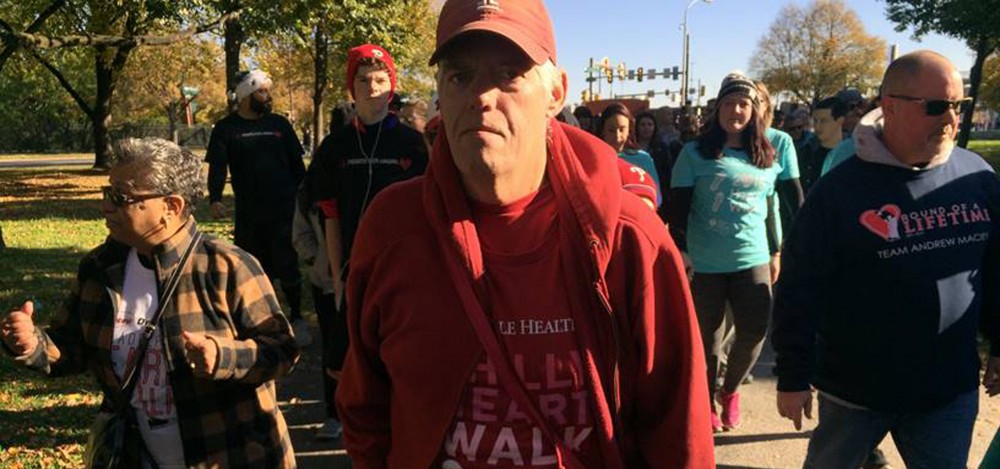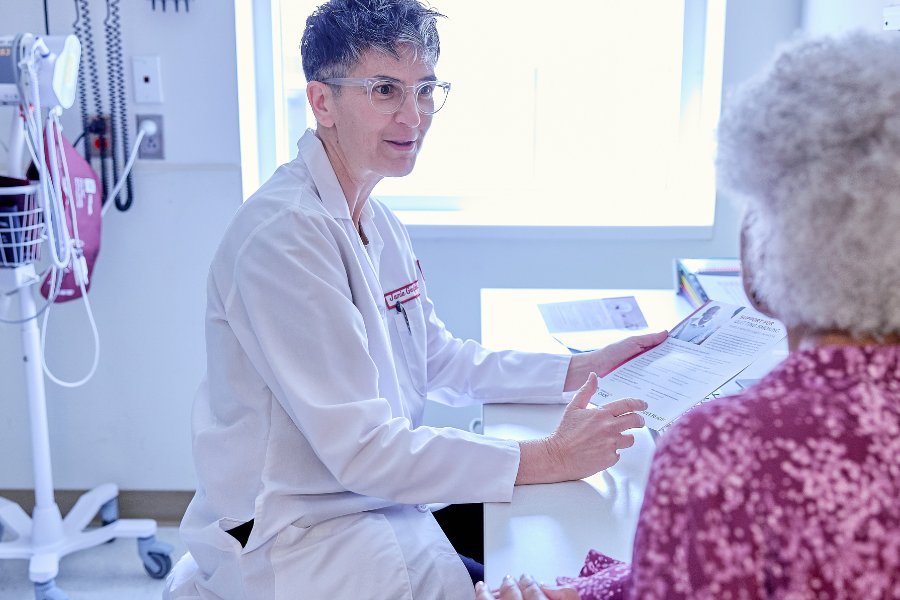
Joseph Beinlich showed up for the American Heart Association walk Saturday wearing a red Temple hat, jacket, shirt and shoulder bag filled with two red Temple water bottles.
“I used to wear everything Eagles,” he said. “Eagles didn’t do nothing for me. Temple did.”
Taped to his back were two stories, explaining his medical miracle — how he received an artificial heart, and then a year later a new human heart.
But those stories didn’t really get to the heart of the matter — the countless little ways staff supported him, believed in him, the dignity this gave him.
“How was your first Uber ride, Joe?” asked Laura Brobst, the social worker who had arranged it for him, when it looked like the SEPTA strike would keep him away.
“Great,” he said. Brobst was working at the hospital Saturday, not even walking, but stopped by Citizens Bank Park to make sure Joe was settled in and ready.
Many by the Temple tent greeted Joe like a celebrity. He spent seven months as an inpatient. Cardiologist Daniel Edmundowicz, noting Joe’s Temple gear, quipped, “Next year we’ll get you in the Owl suit.”
Joe, 58, was working as a dishwasher at Sesame Place in July of 2014 when he suffered a massive heart attack. He received Temple’s first total artificial heart a week later.
Joe needed to pass a test before he could go home, to make sure he could take care of himself, and he struggled.
“He couldn’t pass the test at first,” said Natisha Robinson, the nurse manager in the heart unit. “He was upset.”
Joe failed first and third grade, and dropped out of high school after ninth grade, at age 18. On top of his learning challenges, he had become an alcoholic.
Staff set up his hospital room as if it were his home. He had to take his own blood pressure, weight and other measurements and log them.
“I asked him to show me how he does his weight,” said Robinson. “He got on the scale. He got out the log book but then he stopped.”
“What’s going on Joe?” she asked.
“I can’t read it,” he said.
He had never been to an eye appointment. He ended up with reading glasses.
“From there he excelled,” she said.
“For a guy who maybe could have been forgotten about, or not given a chance at a new life, we did,” said Robinson. “Temple gave him that chance. And just to see him now is amazing. It makes everything you go through worth it.”
They got orthotics for his shoes. They pulled his bad teeth and made him dentures. They got him health insurance. Brobst got his entire work history — line cook, parking attendant, cellphone packer, and more — and helped him file for Social Security benefits. He now lives on $757 a month.
Because his living situation was precarious, Brobst found him a room in a personal care home on Broad Street. Staff got him a phone through a provision in the Affordable Care Act so they could call to remind him of appointments and check on him.
When he calls Brobst, he identifies himself as, “this is your favorite pain –in-the-ass patient.”
A transplant psychologist also helped him control his incredible thirst for alcohol. She gave him strategies, like pausing to write down what had upset him whenever he felt the urge to drink. “If it wasn’t for her…,” he says.
Joe went by the hospital Friday to get a blood test and pick up his heart walk t-shirt.
“What time are you setting your alarm?” Brobst asked him.
“6:30.”
“What time are you turning your phone on, so I can call you?”
“7:30.”
“What time is the Uber coming?”
“Around 7:45.”
Joe had been practicing for this walk. Every day, he’d walk a mile from his rooming house to the Save-A-Lot grocery store, and then back. And he’d walk another half mile to a food truck and buy a coffee.
Saturday was a beautiful autumn day, and thousands walked from the stadium complex, around FDR Park, and back — three miles.
Joe walked by himself, at his own speed, with a cane. But really everyone was his friend, especially those with dogs. He’d pet a dog, start a conversation.
“I wouldn’t be alive without Temple,” he told one woman, a lab tech at another hospital, walking a Labrador. “Take a look at my back.”
She glanced at the article. “I’ve been sober for 27 years,” she said. “We all got a story. We could all walk around with a sign on our back.”
About half way, he sat on a guardrail to rest. Two walkers stopped.
“You ok sir? We’re nurses.”
“I like nurses,” he said. “I wouldn’t be here without nurses. You nurses take a look at my back.”
They were from Mercy Philadelphia. They read his back.
“God bless you,” one said.
After a moment, he was on his feet again.
“Alright, mush,” he said.
He saw two young women sitting on a bench, smoking.
“You’ll wind up like this,” he said, showing them his back. “I smoked a pack a day.”
“I’m trying to stop,” one said meekly.
The more he walked the more confident and proud of himself he got. Taking care of himself, doing this heart walk, was his way of thanking, repaying, those who had helped him.
After one hour and twenty minutes, he reached Xfinity Live!, the sports bar across from Citizens Bank Park. He sat outside on a planter and called Brobst.
“I’m pretty sure I could walk another mile or two,” he boasted.
She ordered him an Uber — several staffers had agreed to chip in — and in no time it was there.
He climbed into the backseat, chauffeured home like royalty.

